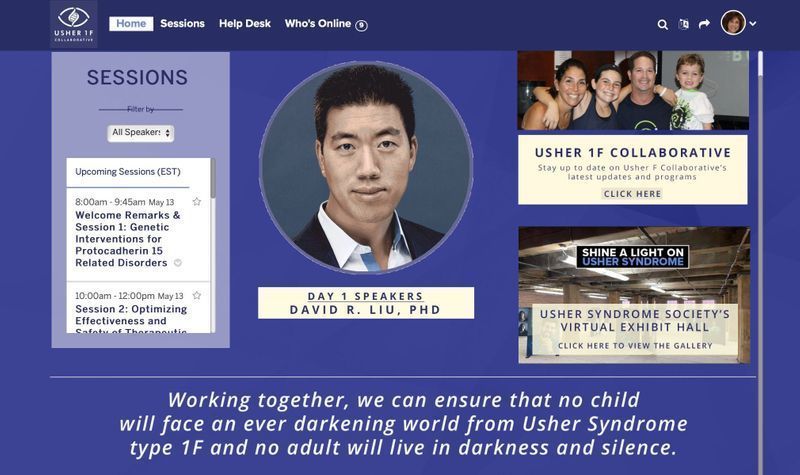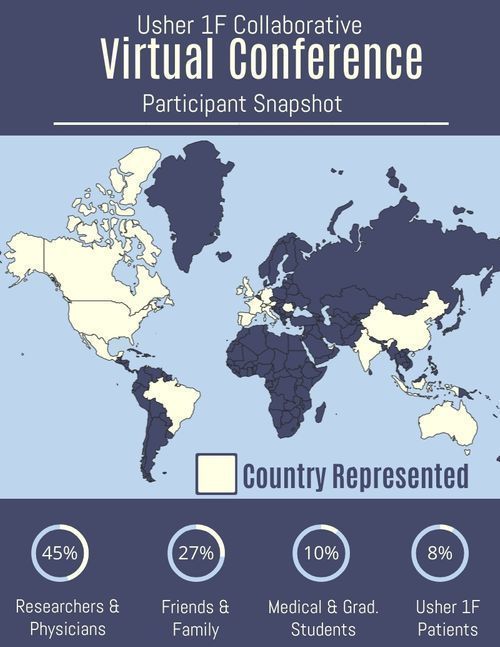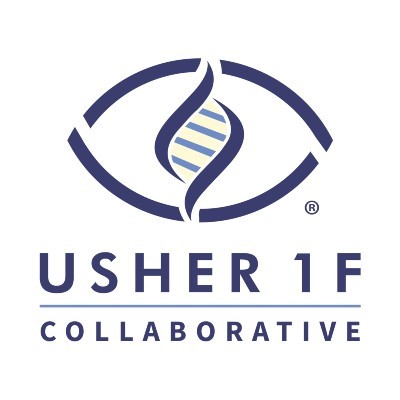
On May 13th and 14th, 2021, Usher 1F Collaborative hosted a virtual international scientific research conference, Therapeutic Strategies for Large Protein Coding Genes in Usher Syndrome. We are grateful to the Chan Zuckerberg Initiative (CZI) for funding the conference through our Rare As One Project grant, as well as to our sponsors, The Ardent Companies, Associated Agencies, I. Halper Paper & Supplies, and Franklin Mutual Insurance.
Because Usher 1F alone would have been a small topic for a major research conference, we opted to expand the focus to include other types of Usher syndrome caused, as is Usher 1F, by mutations in large genes. Our goal for this meeting was to bring together investigators to share ideas and foster collaborations, both those whose areas of research focus on Usher syndrome, as well as those working on the development of relevant scientific approaches and tools.
Thanks also to our CZI grant, we were able to hire TalkingTree Creative to manage all the technical aspects of our conference. Even with a live virtual conference with speakers from all over the US, Canada, Europe, and Australia, the production was nearly flawless.
Usher 1F Collaborative president and co-founder Melissa Chaikof kicked off the meeting, welcoming all the attendees, stating that this is a deeply personal cause for her since her two daughters have Usher 1F but added that, through her work, she has come to care about all of those with Usher 1F who so desperately want a cure. Elliot Chaikof, MD, PhD, then served as host for the conference, introducing session moderators and asking and fielding questions after each talk.
Attendees were treated to presentations from our Usher 1F researchers, from scientists working on tools and therapies applicable to all types of retinitis pigmentosa (RP), including those for genome repair, and from those working on cures for Usher 1B, 1D, and 2A. Attendees and speakers were able to chat with others through the conference platform. Also included on the platform was an incredibly moving virtual exhibit from the Usher Syndrome Society, Shine a Light on Usher Syndrome, comprised of portraits and quotes from many with Usher Syndrome.
Highlights from our Usher 1F researchers include:
- Alex Hewitt, MD, PhD, from the Centre for Eye Research Australia on his work with base editing for the most common Usher 1F mutation
- Livia Carvalho, PhD, University of Western Australia, on her work with dual vector delivery of the Usher 1F gene
- Zubair Ahmed, PhD, University of Maryland, on his Usher 1F mouse model and testing of two promising drug therapies
- Vincent Tropepe, PhD, University of Toronto, on his development of a zebrafish model of Usher 1F to study disease mechanism and potential pathways to a cure
- Monte Westerfield, PhD, University of Oregon Institute of Neuroscience, on his Usher 1F zebrafish model and testing of two potential treatments
- David Corey, PhD, Harvard Medical School, on his development of three types of gene therapies for Usher 1F
- Budd Tucker, PhD, University of Iowa, on his work on stem cell therapy

Retinal specialists Katarina Stingl, MD, University of Tübingen, and Francesca Simonelli, MD, University of Campania, discussed the Usher 1F and Usher 1B, respectively, natural history studies. The concluding session was a treat with presentations by those in industry developing precision drugs for Usher Syndrome, including Editas Medicine, ProQR Therapeutics, and Eloxx Pharmaceuticals.
Over 300 persons registered for the conference from locations not just in the US but from all over the world. While we missed the personal face-to-face interactions more readily facilitated by an in-person conference, holding it online enabled more people to join us to benefit from the wealth of valuable information presented.
Elliot Chaikof closed the meeting, thanking everyone for joining us for our two-day conference, urging the scientists to continue their work, telling them, “We need your best ideas,” adding that it is not only about caring but also curing.
